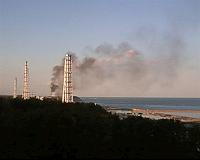| . |  |
. |
Strasbourg (AFP) April 25, 2011 Anti-nuclear activists in France and Germany staged mass protests Monday to demand reactors be closed on the eve of the 25th anniversary of Chernobyl and after Japan's Fukushima nuclear accident. As organisers said tens of thousands of demonstrators joined nationwide protests in Germany to call for an end to nuclear power, hundreds of activists at Strasbourg on the French-German border staged a dramatic "die in". Nearly 145,000 German protesters took part in demonstrations at 12 different sites in Germany and France, organisers said, as part of the traditional annual peace protest known as the Easter March. Between 6,000 and 9,000 mostly German activists took to different bridges on the Rhine between Germany and France, AFP journalists reported, with the main Easter Monday demonstration involving hundreds. The protest at the midway point on the Pont de l'Europe joining Strasbourg in eastern France and Kehl in Germany aimed to show that "radioactivity knows no borders," said organiser Remi Verdet. "We're here to remind people that zero risk does not exist," he said. The protests marking the worst-ever nuclear accident at Chernobyl in Ukraine on April 26, 1986 and Fukushima were also aimed at getting France, proportionally the world's biggest user of nuclear power, and Germany to shut ageing plants. Protesters carrying Japanese and Ukrainian flags dropped to the tarmac as sirens wailed for the "die in", before they threw flowers into the Rhine in memory of those killed by nuclear accidents. A powerful March 11 earthquake followed by a giant tsunami cut the electricity to Fukushima's nuclear reactors, shutting down the cooling system and leading to the world's worst nuclear crisis since Chernobyl. In Germany, more than 10,000 people protested in the northwestern town of Gronau, home to a uranium enrichment facility, to demand the closure of the site, organisers said. Demonstrations also took place at Germany's nuclear power stations, including Biblis in the southwest and Krummel in the north. The German government imposed a three-month moratorium on extending the lifespans of the nation's nuclear reactors following the Fukushima disaster. Just last year Chancellor Angela Merkel had granted 12-year extensions to the country's nuclear reactors, which produce about a quarter of Germany's electricity. In France, protesters' demands were focused on getting the country to shut its oldest nuclear power station at Fessenheim. In service since 1977, the Fessenheim plant lies in a densely populated area less than two kilometres (1.2 miles) from Germany and around 40 kilometres from Switzerland. Around 2,000 people, including many Germans and Luxembourgeois, also protested at the Cattenom atomic plant, France's second most powerful, in the Mosel region to the northwest of Strasbourg, officials said. Protesters in southwestern France staged a demonstration in the form of a mass picnic in front of the Blayais nuclear reactor, north of Bordeaux, also in memory of Chernobyl. "We can't stop tsunamis but we can stop nuclear power stations," read one banner at the event which organisers said drew around 1,000 people, while police put the number at 600. France's Nuclear Safety Authority (ASN) has said that French nuclear security has not yet taken into account the kind of accumulation of natural catastrophes that led to Japan's disaster. The French government has told the ASN to carry out a security audit at France's 58 active atomic reactors. The results of the audit are expected by the end of the year. In the Austrian capital Vienna, about 1,000 people also demonstrated to call for an end to nuclear power, including Chancellor Werner Faymann who hailed the country's long opposition to atomic energy. "Since Chernobyl, 160 new nuclear stations," have opened, he said, warning against the "cynical" nuclear energy lobby that wants accidents like Chernobyl and Fukushima to be "forgotten". burs-mm/mlr/
Share This Article With Planet Earth
Related Links Bringing Order To A World Of Disasters A world of storm and tempest When the Earth Quakes
 Telling truth main lesson of Chernobyl, Fukushima: Medvedev
Telling truth main lesson of Chernobyl, Fukushima: MedvedevMoscow (AFP) April 25, 2011 The main lesson of Chernobyl and Fukushima is that authorities must tell the truth, Russian President Dmitry Medvedev said Monday ahead of the 25th anniversary of the world's worst nuclear disaster. Medvedev made the plea for transparency in nuclear emergencies at a meeting in the Kremlin with rescue workers who were charged with cleaning up Chernobyl and have long complained of being unawar ... read more |
|
| The content herein, unless otherwise known to be public domain, are Copyright 1995-2010 - SpaceDaily. AFP and UPI Wire Stories are copyright Agence France-Presse and United Press International. ESA Portal Reports are copyright European Space Agency. All NASA sourced material is public domain. Additional copyrights may apply in whole or part to other bona fide parties. Advertising does not imply endorsement,agreement or approval of any opinions, statements or information provided by SpaceDaily on any Web page published or hosted by SpaceDaily. Privacy Statement |